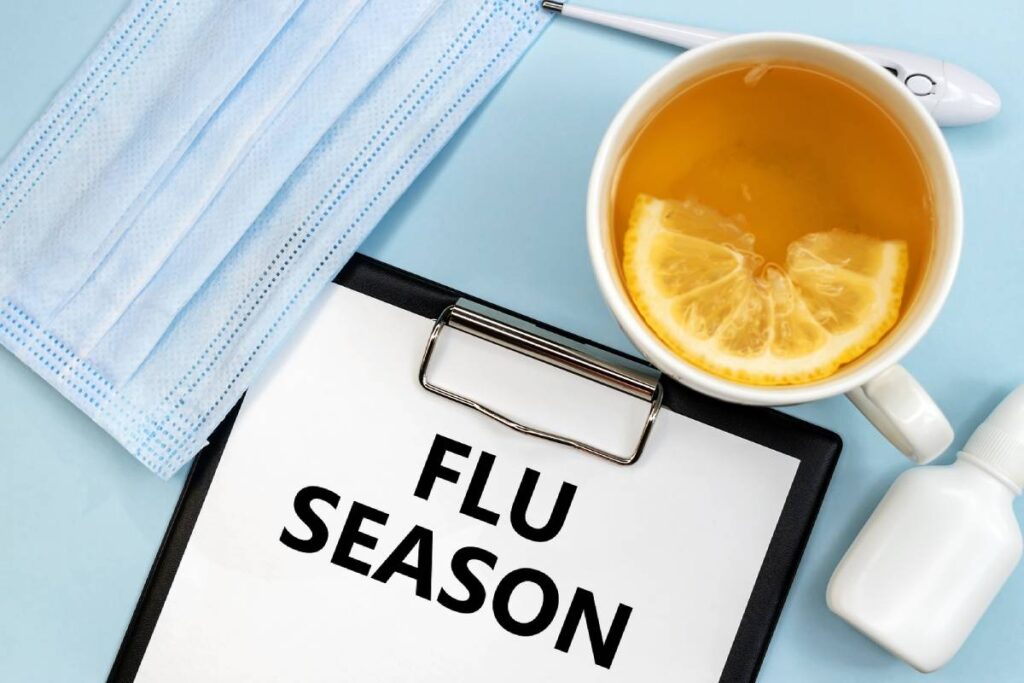We know that flu season 2022 is around the corner. Flu, also called influenza, is an infection caused by a virus that affects the nose, throat, and lungs. Flu season in the United States can begin as early as October. Outbreaks may not appear until January or February. We may sometimes foretell how severe or mild our influenza season will be by looking at patterns in the Southern Hemisphere as they are a season ahead of us.
Flu is highly contagious. Adults can transmit the virus one day before the onset of symptoms and up to seven days after the symptoms start. Influenza is often transmitted through a person’s coughs and sneezes. It is hazardous for the elderly, the young, and those with compromised immune systems.
Overlapping Flu and COVID Symptoms
COVID-19 and influenza (flu) are infectious respiratory diseases caused by different viruses. COVID-19 is caused by a coronavirus discovered for the first time in 2019, whereas the infection with the influenza virus causes influenza (influenza viruses).
In some people, COVID-19 can cause more severe infections than influenza. COVID-19 can cause a delay in the onset of symptoms, and individuals can be contagious for extended periods.
Because their symptoms are similar, the flu and COVID-19 cannot be separated solely by their signs and symptoms. As a result, testing is required to identify the ailment and confirm the diagnosis. Testing is critical since it can determine whether a person has both influenza and COVID-19. (Centers for Disease Control and Prevention)
5 Things To Do To Prepare For The Flu Season
Get your flu shot: The flu vaccine lowers the overall risk of flu illness and the chances of becoming seriously ill if infected. The CDC recommends vaccination for anybody above the age of six months. People should get a flu shot in September and October to be ready for the start of flu season.
Wear a mask: Even if you have been immunized against COVID-19 and the flu, you should still wear a mask in public, especially if you are going where crowds are expected.
Maintain awareness regarding safety precautions: Like COVID-19, influenza viruses are spread by nasal and oral secretions. All the steps taken to avoid COVID-19, like getting vaccinated, wearing a mask in public, staying at least six feet away from people, and washing your hands often, may also lower your chance of getting the influenza virus.
Identify your symptoms: The influenza virus and COVID-19 cause fever, coughing, shortness of breath, and muscle aches. If you experience any of these symptoms, contact your doctor right away. They can advise you on what to do next, including if you should be tested for influenza or COVID-19 or if you should be given COVID-specific antiviral therapy or an influenza antiviral treatment.
Stay indoors: If you’re sick, stay at home and get a COVID-19 test. If you have the flu or COVID-19, you should stay home until you feel better to avoid infecting others. (Pogored)
Which Flu Vaccine Should Children Get?
Many people are unaware of the risks of influenza (flu), especially in previously healthy children and adolescents. Vaccination is the best way to protect your children and others from influenza.
Every year, influenza viruses evolve. Thus, all children aged six months and up require a flu shot yearly. All children aged six months and above should get their influenza vaccine as soon as it is available, especially those needing two shots per season. This way, they will be protected before the flu spreads in their community. Immunity takes roughly two weeks to develop following the dose. (HealthyChildren.org)
When to go to the ER with Flu?
Some people are more likely to have severe problems with the flu (this includes young children, people over 65, pregnant women, and people with specific health problems). Call your doctor if you have flu symptoms, are in a high-risk group, are seriously ill, or are worried about your health. The Centers for Disease Control and Prevention (CDC) recommends that those at a higher risk of problems take antiviral medications as soon as possible because the efficacy is most significant if therapy begins within two days of disease onset. (Centers for Disease Control and Prevention)
Flu might appear relatively less harmful, but it is essential to visit the doctor if you are in an at risk population. Especially with the added layer of COVID-19, it is ideal not to risk hospitalization and get tested as soon as the symptoms appear.
Works Cited
SITNFlash. “The Reason for the Season: Why Flu Strikes in Winter.” Science in the News, 4 Dec. 2016, sitn.hms.harvard.edu/flash/2014/the-reason-for-the-season-why-flu-strikes-in-winter/.
Centers for Disease Control and Prevention. “Flu: What to Do If You Get Sick.” Centers for Disease Control and Prevention, Centers for Disease Control and Prevention, 31 Aug. 2021, www.cdc.gov/flu/treatment/takingcare.htm.
Mayo Clinic. “Influenza (Flu).” Mayo Clinic, Mayo Foundation for Medical Education and Research, 1 Nov. 2021, www.mayoclinic.org/diseases-conditions/flu/diagnosis-treatment/drc-20351725.
HealthyChildren.org. “Which Flu Vaccine Should Children Get?” HealthyChildren.org, healthychildren.org/English/health-issues/conditions/flu/Pages/which-flu-vaccine-should-my-child-get-this-year.aspx.
Centers for Disease Control and Prevention. “Similarities and Differences between Flu and Covid-19.” Centers for Disease Control and Prevention, Centers for Disease Control and Prevention, 18 Jan. 2022, www.cdc.gov/flu/symptoms/flu-vs-covid19.htm.
Pogored. “How to Prepare for Flu Season This Year.” Cleveland Clinic, Cleveland Clinic, 17 Aug. 2022, health.clevelandclinic.org/when-is-flu-season/.




